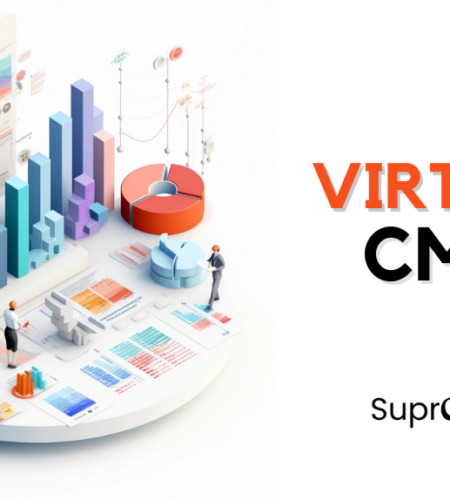
Effective marketing strategies are crucial for driving growth and ensuring long-term success in today’s competitive business landscape. As a Virtual Chief Marketing Officer (CMO), I am dedicated to providing strategic leadership and expertise in Performance Metrics and Engagement Models. By leveraging data-driven insights and innovative engagement techniques, I help organizations optimize their marketing efforts, enhance customer experiences, and achieve measurable results.
A Virtual Chief Marketing Officer (CMO) can be pivotal for organizations harnessing digital technologies to enhance their marketing strategies. This role focuses on leveraging data analytics and AI tools to drive marketing efforts, ensuring that campaigns are data-driven and results-oriented. Here are some core performance metrics and engagement models a Virtual CMO might focus on:
Performance Metrics
Customer Acquisition Cost (CAC) Measures the cost of acquiring new customers. Lowering CAC while maintaining quality leads is a primary goal.
Customer Lifetime Value (CLV) estimates the total revenue a business can expect from a single customer account. It helps determine how much to invest in maintaining or expanding customer relationships.
Return on Investment (ROI): This measure tracks the efficiency of different marketing campaigns, measuring the return on marketing investments against the cost.
Conversion Rates: Monitors the percentage of users who complete a desired action, helping to gauge the effectiveness of specific campaigns or channels.
Engagement Rates Measure how actively involved your audience is with your content, which is essential for social media and digital campaigns.
Engagement Models
Content Marketing: Utilizing AI to analyze customer data and create personalized content strategies that attract and engage users more effectively.
Social Media Marketing: Leveraging AI tools to optimize posting times, analyze user engagement, and automate real-time responses.
Email Marketing Automation: Using AI to personalize email content based on user behavior and preferences, increasing open and click-through rates.
Predictive Analytics: Implementing AI-driven models to predict future buying behaviors and preferences, allowing proactive customization of marketing strategies.
The Rise of Virtual CMOs in Navigating Performance Metrics for Success
In the rapidly evolving digital marketing landscape, the emergence of Virtual Chief Marketing Officers (CMOs) marks a significant shift in how businesses approach strategic marketing management. Leveraging advanced artificial intelligence (AI) and machine learning technologies, Virtual CMOs are transforming traditional marketing roles by providing insights and strategic guidance without the overhead of a full-time executive.
These AI-driven professionals are cost-effective and exceptionally efficient in navigating complex data landscapes to drive marketing success. By focusing on key performance metrics and harnessing the power of data analytics, Virtual CMOs enable organizations to achieve precise marketing objectives, optimize their marketing spend, and significantly enhance customer engagement.
As businesses increasingly prioritize agility and intelligent decision-making, Virtual CMOs stand at the forefront, leading the charge in the digital transformation of marketing strategies.
Unlocking Engagement Models with a Virtual CMO: Strategies for 2024
As we enter 2024, the marketing landscape continues evolving, driven by technological advancements and changing consumer behaviors. To stay ahead, businesses must adopt innovative strategies that enhance customer engagement and deliver measurable results.
A Virtual Chief Marketing Officer (CMO) plays a pivotal role in this transformation, providing strategic guidance and expertise in leveraging cutting-edge engagement models. This guide explores how a Virtual CMO can unlock powerful engagement strategies, helping organizations thrive in the dynamic market of 2024.
As we look towards the future of marketing, unlocking the power of engagement models with a Virtual CMO becomes crucial for businesses. Here are some critical strategies for 2024:
Personalized Experiences: Virtual CMOs will continue leveraging AI and data analytics to deliver personalized customer experiences, fostering brand loyalty and driving engagement.
Agile Engagement Models: In response to rapidly changing market conditions, Virtual CMOs will adopt agile engagement models, enabling businesses to adapt quickly and seize new opportunities.
Emerging Technologies: By harnessing emerging technologies, such as AR/VR, chatbots, and voice assistants, virtual CMOs will create innovative and immersive experiences to enhance customer engagement.
Social Media Engagement: Virtual CMOs recognize the importance of social media in driving customer interactions and will prioritize social media engagement as a key component of their engagement models.
Data-driven Insights: By analyzing engagement data, Virtual CMOs will uncover actionable insights to optimize marketing strategies, ensuring continuous improvement and growth.
In 2024, businesses that embrace Virtual CMOs and their expertise in engagement models will be well-positioned to succeed in the ever-evolving marketing landscape.
Virtual CMOs: The Game-Changer in Performance Metrics for Modern Businesses
Virtual Chief Marketing Officers (CMOs) are emerging as game-changers for modern businesses in the rapidly evolving digital marketing landscape. These AI-driven professionals bring advanced technology and strategic insight, transforming how companies approach marketing performance metrics. By leveraging data analytics and machine learning, Virtual CMOs offer precision and efficiency that traditional marketing roles often struggle to achieve.
Virtual CMOs can navigate complex data sets to provide actionable insights, allowing businesses to make informed, data-driven decisions. Key performance metrics such as Customer Acquisition Cost (CAC), Customer Lifetime Value (CLV), Return on Investment (ROI), conversion rates, and engagement rates are meticulously monitored and optimized.
This data-centric approach ensures that marketing strategies are continuously refined for maximum impact and cost-effectiveness.
One of the standout advantages of Virtual CMOs is their ability to implement sophisticated engagement models tailored to today’s digitally connected consumers.
Maximitoday’sI: Virtual CMO Insights on Performance Metrics in 2024
In 2024, the Virtual Chief Marketing Officer (CMO) role has become indispensable for businesses aiming to maximize their return on investment (ROI) through strategic marketing initiatives. Leveraging advanced artificial intelligence (AI) and data analytics, Virtual CMOs provide deep insights into performance metrics crucial for optimizing marketing efforts and driving business success.
The Importance of Performance Metrics
Performance metrics are the backbone of any successful marketing strategy. They provide quantifiable data that helps businesses understand their marketing campaigns’ effectiveness, identify improvement areas, and allocate resources more efficiently. Key metrics that Virtual CMOs focus on include:
Customer Acquisition Cost (CAC): This metric measures the cost of a new customer. By analyzing CAC, Virtual CMOs can identify the most cost-effective channels and strategies, ensuring that marketing budgets are spent wisely.
Customer Lifetime Value (CLV): CLV estimates the total revenue a business can expect from a single customer throughout their relationship. Understanding CLV helps companies prioritize customer retention and loyalty programs, which are often more cost-effective than acquiring new customers.
Return on Investment (ROI): ROI is a critical metric that measures the profitability of marketing campaigns. Virtual CMOs use AI to track and analyze ROI across various channels and campaigns, providing insights into which strategies deliver the best returns.
Conversion Rates: Conversion rates indicate the percentage of users who complete a desired action, such as purchasing or signing up for a newsletter. Virtual CMOs help businesses improve their sales funnel efficiency by monitoring and optimizing conversion rates.
Engagement Rates: Engagement rates measure how actively users interact with a brand’s content. High engagement rates often correlate with increased brand loyalty and customer retention. Virtuabrand’suse AI to analyze engagement data and tailor content strategies to boost user interaction.
Strategies for Maximizing ROI
Virtual CMOs employ several strategies to maximize ROI through performance metrics:
Data-Driven Decision Making: Virtual CMOs make informed decisions based on real-time data by leveraging AI and data analytics. This approach reduces guesswork and ensures that marketing strategies are grounded in solid evidence.
Personalization: Virtual CMOs use AI to create highly personalized marketing campaigns that resonate with individual customers. Personalization enhances customer experience, leading to higher engagement and conversion rates.
Optimized Resource Allocation: By analyzing performance metrics, virtual CMOs can identify high-performing channels and allocate resources accordingly. This optimization ensures that marketing budgets are used effectively, maximizing ROI.
Continuous Improvement: Virtual CMOs adopt an iterative approach to marketing, constantly analyzing performance metrics and refining strategies. This constant improvement cycle helps businesses stay ahead of market trends and maintain a competitive edge.
Trends: How Virtual CMOs Drive Engagement Models and Deliver Results
In the fast-paced and ever-evolving world of digital marketing, Virtual Chief Marketing Officers (CMOs) are emerging as pivotal figures in shaping engagement strategies and delivering tangible results. These AI-driven experts bring a unique blend of technology and strategic insight, enabling businesses to navigate the complexities of modern marketing with unprecedented efficiency and precision.
By leveraging advanced data analytics and machine learning, Virtual CMOs craft personalized and dynamic engagement models that resonate deeply with target audiences. This approach enhances customer interaction and drives higher conversion rates and long-term loyalty.
As businesses continue to embrace digital transformation, the role of Virtual CMOs in driving engagement and delivering measurable outcomes is becoming increasingly crucial. This introduction explores the key trends in how Virtual CMOs are revolutionizing engagement models and achieving remarkable results in today’s competitive landscape.
The Future of Marketing: Virtual CMOs and Next-Gen Performance Metrics
The future of marketing is today ‘shaped by the rise of Virtual Chief Marketing Officers (CMOs) and the adoption of next-generation performance metrics. As businesses increasingly rely on digital strategies to reach and engage their audiences, Virtual CMOs are emerging as essential players, leveraging advanced technologies to optimize marketing efforts and drive growth. These AI-driven professionals are equipped to handle the intricacies of modern marketing with unparalleled precision, utilizing data analytics and machine learning to provide deep insights and strategic guidance.
Next-gen performance metrics are at the heart of this transformation, offering more sophisticated and granular insights into marketing effectiveness. Traditional metrics like Customer Acquisition Cost (CAC) and Return on Investment (ROI) are complemented by advanced metrics that provide a more comprehensive view of customer interactions and behaviors. Metrics such as Customer Lifetime Value (CLV), predictive analytics for customer behavior, and real-time engagement metrics are becoming crucial for understanding and optimizing the entire customer journey.
Enhancing Customer Engagement: Virtual CMO Best Practices for 2024
As we approach 2024, enhancing customer engagement remains a top business priority. Here are the best practices Virtual CMOs will employ to drive customer engagement in the coming years:
Personalized Experiences: Virtual CMOs will leverage AI and machine learning to deliver highly personalized experiences, ensuring customers feel valued and understood.
Omnichannel Engagement: By creating a seamless brand experience across all channels, Virtual CMOs will foster consistent engagement and build strong customer relationships.
Interactive Content: To engage customers in meaningful ways, Virtual CMOs will prioritize interactive content that encourages active participation and fosters brand loyalty.
Social Media Engagement: Recognizing the power of social media, Virtual CMOs will focus on creating engaging social media content that resonates with their target audience and drives meaningful interactions.
Data-driven Insights: By leveraging data analytics, Virtual CMOs will gain valuable insights into customer preferences and behaviors, enabling them to refine their engagement strategies for optimal impact.
In 2024, businesses that embrace these best practices and partner with a Virtual CMO will be well-positioned to drive customer engagement and achieve lasting success.
Conclusion:
Understanding and leveraging performance metrics and engagement models are critical to any successful marketing strategy. A Virtual CMO can help your business navigate these complex concepts, ensuring you effectively measure and optimize your marketing efforts.
By monitoring essential performance metrics and implementing the appropriate engagement model, your business can drive customer engagement, improve campaign effectiveness, and achieve sustainable digital growth. Partner with a Virtual CMO to harness the power of data-driven decision-making and elevate your marketing strategies to new heights.
Email: [email protected]


Comments